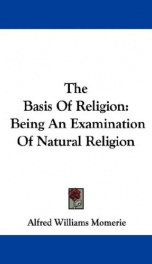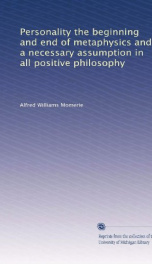belief in god

Purchase of this book includes free trial access to www.million-books.com where you can read more than a million books for free. This is an OCR edition with typos. Excerpt from book: CHAPTER IV. SUPERNATURAL PURPOSE. TT7E have seen it is admitted by Haeckel, the most eminent materialist of modern times, that what we call matter is always accompanied by something mental. We have seen further it is admitted by Mr Herbert Spencer, the philosophic exponent of agnosticism, that there exists, and has always existed, an Inscrutable Power, of which every phenomenon is a manifestation, and of which our own finite consciousness is a mode. Evidently then the theory of evolution, according to its ablest exponents, allows and compels us to believe that something of the nature of mind has existed all through the evolutionary development of matter. It remains to inquire whether that development has been in any way mentally determined. In other words, is the world in which we live the result of design ? Now it is remarkable that, from the very beginning, men have generally found it impossible to eradicate the belief in superhuman purpose. Sometimes this purpose is regarded as immanent, and sometimes as transcendent; but implicitly, if not explicitly, it is always admitted. E.g., Epicurus, who tried to put an end to the religious terrors of the time, by showing that there was no supernatural interference with mundane affairs, transferred to the atoms the purpose which he denied to the gods. It had been asserted by Democritus that collisions took place among the primitive particles of matter, because the larger particles moved faster than the smaller, and so overtook and combined with them. To this Aristotle had objected that in empty space, where there was no atmospheric resistance, everything would fall equally fast, and so the combinations would never have been effected. The force of this objection was acknowledged by Epicurus. In order to obviate it, he imagined a...
Info about the book
Author:
Series:
Unknown
ASIN:
B0006C5BYW
Rating:
4/5 (1)Your rating:
0/5
Languge:
English
Users who have this book
Users who want this book
What readers are saying
What do you think? Write your own comment on this book!
write a commentif you like belief in god try:
Other books by this author
Do you want to read a book that interests you? It’s EASY!
Create an account and send a request for reading to other users on the Webpage of the book!





